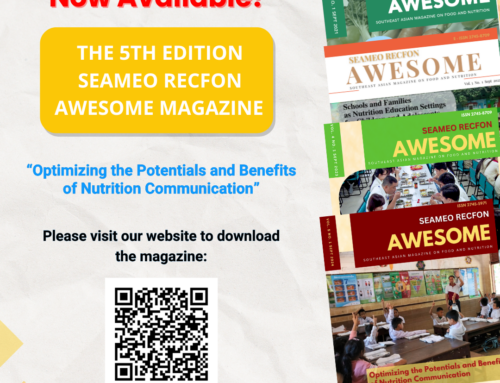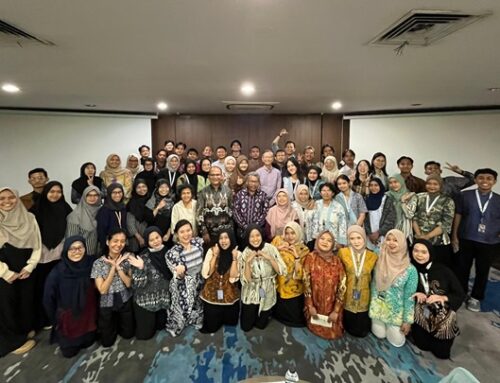Jakarta, 13 February 2025
The SEAMEO Regional Centre for Food and Nutrition (RECFON), with the support of the United Kingdom Research and Innovation – Global Challenges Research Fund (UKRI GCRF), organized the Dissemination of Initial Findings from the Action Against Stunting Hub (AASH) Indonesia Study and the Policy Discussion on Accelerating Stunting Reduction at Hotel Gran Melia, Kuningan, South Jakarta. This event formed part of the 14th Anniversary celebrations of SEAMEO RECFON.
In his opening remarks, Dr. Herqutanto, MPH., MARS., Sp.KKLP, Acting Director of SEAMEO RECFON, expressed his appreciation for the participants’ presence and reaffirmed SEAMEO RECFON’s commitment to addressing stunting. “Decades of research have identified various contributing factors to stunting, including dietary patterns, parenting practices, malnutrition, poor sanitation and hygiene, exposure to enteric pathogens, and inadequate psychosocial stimulation. The complexity of these factors requires a thorough understanding of their interactions and synergies. Through this dissemination event, we aim to share insights and valuable information to accelerate the achievement of our national stunting reduction targets.”
Prof. Dr. Hamdi Muluk, M.Si, Vice-Rector for Research and Innovation at Universitas Indonesia, underlined the importance of evidence-based research in public policy. “We hope this study will promote the adoption of more effective policies that can be widely adopted to reduce stunting prevalence in Indonesia, particularly in the Lombok region.”
Meanwhile, the Deputy for Family Quality Improvement and Population Coordination at the Coordinating Ministry for Human Development and Culture, Woro Srihastuti Sulistyaningrum, ST., MIDS, emphasized the need for a holistic and integrative intervention in tackling stunting. “By 2025, we aim to reduce the stunting rate to 18%. Prioritizing a strategy focused on early childhood development using a holistic and integrative framework—known as ECE HI—is necessary to meet this goal.”
The AASH research was conducted across three countries: India, Indonesia, and Senegal with East Lombok chosen as the study site in Indonesia. The study comprises a cohort observation of pregnant women until their children reach 24 months of age, with the embedded intervention of an egg supplementation to enhance maternal dietary intake during pregnancy, a case-control study comparing stunted and non-stunted children, and a food system study. Following a whole-child approach, the AASH study consists of several components including physical (nutrition, gut health, epigenetics), cognition and education, and food system (food environment, food value chain, and Agrifood).
The event was moderated by Prof. dr. Fasli Jalal, Ph.D, Rector of Universitas YARSI, with the main speaker, Dr. Ir. Umi Fahmida, M.Sc, Senior Researcher at SEAMEO RECFON and Country Lead for AASH Indonesia. The discussion was followed by panel discussion with dr. Lovely Daisy, MKM, Director of Family Health Services at the Indonesian Ministry of Health, Ir. Djajeng Baskoro, M.Pd, Senior Expert at the Directorate for Early Childhood Education, Ministry of Primary and Secondary Education, and Yusra Egayanti, S.Si, Apt., M.P, Director of Food Safety and Quality Standards Formulation at the National Food Agency.

Dr. Ir. Umi Fahmida, M.Sc, explained that the study’s findings could be used to inform policy decisions. “We have indeed dedicated this rich dataset for utilization not only for scientific knowledge but also to inform policy decisions.”
The initial findings of the AASH study indicate that stunting is not solely a nutritional issue but is also associated with other factors such as epigenetics, gut health, infections, microbiota, food safety, food environment, and maternal mental health. Therefore, using a whole-child approach, AASH encompasses various components, including 1) nutrition, epigenetics, gut health (Physical component), 2) child development, and psychosocial care (Cognitive component), 3) early childhood learning environment (Educational component), 4) food environment, including WASH (Water, Sanitation, and Hygiene), food safety, food value chain from nutrient-dense foods (Food component).
This event is expected to encourage the development of evidence-based policies, strengthen cross-sectoral collaboration, and involve policymakers in identifying the required data and aligning it with the indicators available in the AASH study to support policy and decision-making. Through synergy between research and policy, it is hoped that the prevalence of stunting can be significantly reduced, ultimately fostering a healthier and more intelligent Indonesian generation.
The event was attended by various Ministries, NGOs, program implementers, partners and SEAMEO Centers Indonesia related to food, health, cognition, and education, including Coordinating Ministry for Human Development and Culture, Ministry of Primary and Secondary Education, Ministry of Health, National Food Agency, National Population and Family Planning Agency, National Agency for Drug and Food Control, Ministry of Agriculture, Ministry of Communication and Information Technology, Ministry of Finance, Ministry of Marine Affairs and Fisheries, Ministry of Public Works and Public Housing, Ministry of Village, Development of Disadvantaged Regions, and Transmigration, Ministry of Women’s Empowerment and Child Protection, National Research and Innovation Agency, Vice President’s Secretariat Ministry of State Secretariat, Indonesian Nutritionists Association, Early Childhood Education and Development (ECED) Council, CISDI, Plan International, British Embassy Jakarta, FAO Indonesia, Universitas Indonesia, Universitas YARSI, and SEAMEO Centre Indonesia.







Leave A Comment